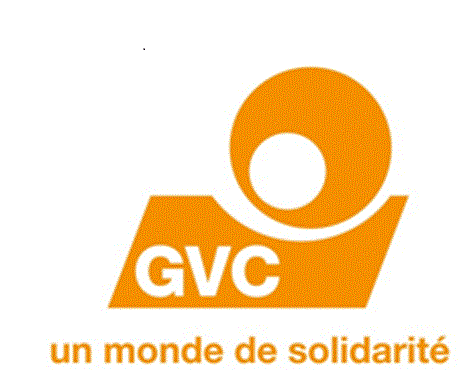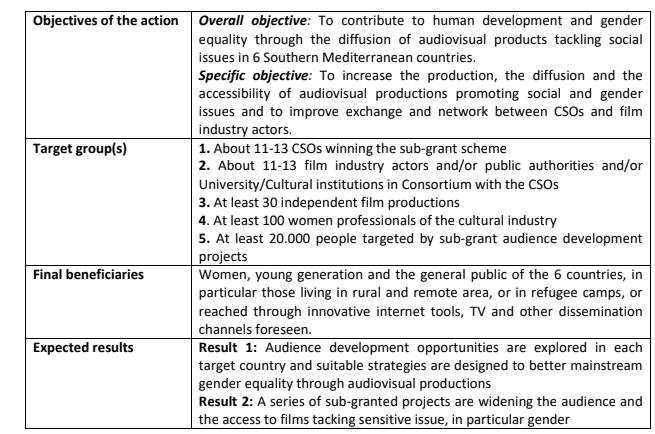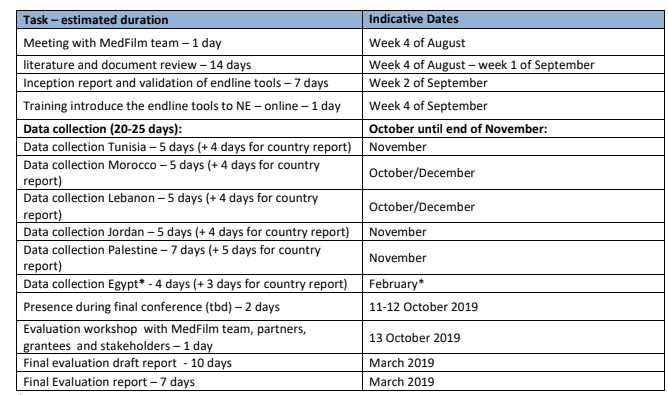WeWorld- GVC recrute un(e) consultant(e) عودة إلى الفرص
Groupe de Volontariat Civil Tunisie
يطلق Offre d'emploiانتهاء الصلاحية
25 أوت 2019 Il y a 6 ans
شارك الفرصة على
تفاصيل الفرصة
المجالات المعنيّة بهذه الفرصة: Droits de l’Homme
Terms of References – External Final evaluation MedFilm4All project
1. Introduction
WeWorld-GVC is an Italian independent organisation born from the merger between GVC NGO (founded in Bologna in 1971) and WeWorld Foundation (founded in Milan in 1999), with the aim of increasing the impact of their Development Cooperation and Humanitarian Aid projects in 29 countries worldwide, including Italy.
Children, women and youth, actors of change in every community, are the protagonists of WeWorld- GVC projects and campaigns in the following fields of intervention: human rights (gender equality, prevention and contrast of violence against women and children, migrations), humanitarian aid (prevention, aid and reconstruction), food security, water and sanitation, health, education and learning, socio-economic development, environmental protection, global citizenship education and international volunteering.
Within the implementation of the regional project MedFilm4All , WW-GVC and its partners seek to evaluate the action implemented between January 2017 and January 2020 in 6 countries: Tunisia, Morocco, Egypt, Palestine, Jordan and Lebanon.
2. Background of the action
The action promotes the adoption of a gender perspective and the role of women in the film industry as professionals and supports the exchanges and the diffusions of films tackling sensitive issues. The action takes place in 6 countries of the southern Mediterranean: Morocco, Tunisia, Egypt, Palestine (oPt), Jordan, and Lebanon. Minor activities are foreseen in Libya too but due to limited security and mobility freedom, Libya will not be directly targeted by the evaluation.
The Barcelona Declaration marked a milestone of the Euro-Mediterranean Partnership, underlining the role of the cultural sector as the core of its 3rd pillar. The Ministers of Culture of the Euro- Mediterranean Partnership gathered in 2008 in Athens, marking a new step for a process aiming at the elaboration of a Euromed strategy on culture. From then, consequently to the so called “Arab springs” and the long lasting conflicts in the Arab world, socio-political environment has changed and new opportunities and challenges are emerging: participation and democratization process on one hand and fundamentalism and violence on the other. While many uncertainties remain, the 2011 events have shown the strength of a young and dynamic generation. The “Arab Spring” has
encouraged the flourishing of associations with innovative visions, made by people connected with global society, and blossoming cultural expression in its digital forms, marking a deeper generation gap. The focus on cultural industries is linked to a newly-emerging global paradigm for development: the potential of participatory and community-based improvement and change. Moreover, the creative and cultural industries have become one of the fastest growing sectors: UNCTAD in May 2013 show that world trade of creative goods and services totaled a record US$ 624 billion in 2011 and that it more than doubled from 2002 to 2011. Growth in developing-country exports of creative goods averaged 12.1% annually over the same period. In the South Mediterranean linking local artists to global market create opportunities for growth and poverty reduction, as well as an occasion to preserve the rich cultural heritage of the region.
There are similarities among the target countries but also many differences and different degrees between them as to how much and how effectively they invest in cinema industry and promote human development through support to the cultural industry as a job creating sector. Therefore, the Action pays special attention in the implementation of specific activities in fragile countries, in order to support and implement a better balance and a shared process of learning among them. The overall idea is to foster effective and sustainable South-South cooperation as well as exchange of good practices including Northern Mediterranean costs, particularly Italy and Spain. There is a
common need in the region for a process of analysis, consultation and dialogue around the role audiovisual can play in improving and convey non-stereotyped image of women.
Nevertheless, some similarities in terms of needs and constraints are evident, such as: lack of opportunities and legitimation of women professionals in the film industry; need of reforms in cultural sector in order to draft more efficient and effective cultural policies at national, regional and local levels, thus considering culture as a mean to convey empowering message and promote gender equality; lack of opportunity and access to funds for CSOs, independent cultural actors, especially those active in rural areas; low access to the cultural venues in rural and remote areas and in refugee camps; difficult access to independent products, weak mainstream and markets both in international and national level; lack of national and regional knowledge and strategy on audience development.
At the end of the action is expected that the Southern Mediterranean region stakeholders, the two co-applicants based in the region (ANND and MENA MM) as well as the CSOs benefitting from the sub-grants will benefit from the following outcomes:
– Suitable strategies exist and are adopted to develop audience of films promoting gender equality
– Sub-granted projects are widening audience and access to gender and social sensitive films
– Awareness on gender issues is improved and stakeholders’ initiatives are networked
3. Summary of the action
4. Scope and objective of the evaluation
The purpose of this evaluation is to assess whether WW-GVC and its partners have reached the objectives and targets set, along with providing recommendations for improved methodologies and further actions to be carried in the same sector. As a sub-grant scheme represents the main instrument used to achieve foreseen Action’s objectives and reach target groups. Twelve projects targeting audience development are financed and supported, which will be the main focus of the evaluation, although not exclusively. The networking and regional management strategies will also be subjected to this final evaluation.
Organizations implementing the sub-granted projects set their action’s objectives following the recommendations of the baseline study (MedBarometer) conducted in January 2018 of the action in the six countries. The Medbarometer study is an extensive research that surveyed the following key issues with a strong emphasis on the gender and rural/urban divides: 1) Access to audio-visual products 2) Gender stereotypes in the media 3) Sensitive social issues. Recommendations and considerations were categorized according to the types of challenges faced by the population in the surveyed areas: logistical and practical barriers, cultural barriers, and offer barriers. As a result designed and implemented activities by sub-granted projects include cine-clubs screenings, film analysis training, teachers training on, social campaigning trainings, awareness raising campaigns, etc. among many others.
The evaluation should be strongly focused on recommendations for improvement relating to the central questions outlined below, and in particular – if and how activities could be adapted to better meet the needs of the target beneficiaries.
According to this baseline this final evaluation should focus on assessing the following elements:
a. Relevance
- To which extent the objectives were consistent with beneficiaries’ needs and priorities ?
- Are the expected outputs of the project consistent with the expected outcome?
- Are there any aspects that the programme did not consider/address and that should be included in future programming?
b. Effectiveness
- How accurate is the rationale established at the beginning of the project? Is it effective, where were the gaps, how should it be adapted and improved for the future?
- To which extent did the project reach its strategic target audience in rural areas?
- To which extent did the project contribute to raising awareness on gender representation in audiovisual production among the targeted population ?
- To which extent did the film screenings and other activities led to dialogue and engagement about perception on gender construction and women’s role in society?
- Have any changes been achieved in relation to policy / practice / attitudes of decision makers / policy makers etc. in the countries where the project is working?
- Were the methods applied for the diffusion of the awareness campaign effective? How could they be improved?
c. Efficiency
- How efficient have the project’s monitoring, management, learning and financial systems been? How can these be improved?
- How have relationships between partners helped or hindered the outcomes? How can these relationships be improved?
- How efficiently was the networking and communication facilitated among the sub- granted organizations and partners organizations?
d. Impact
- How many people were reached by the MedFilm4All awareness campaign ?
- How many screenings, debates and trainings took place with how many participants?
- What changes were observed among participants to sub-granted activities?
- How has the project contributed to participants’ view of role of women in society?
- How have the sub-granted organizations have benefitted from the technical trainings and support? Which improvements could be suggested?
- To which extent has the achievement of the changes been influenced by external factors? To which extent are changes attributable to the project activities?
e. Sustainability
- Which elements furthering sustainability of results did the project design include, if any? Which other would be suggested ?
- Are the activities put in place by sub-granted projects likely to remain following the end of the project?
- Were significant collaborations with relevant audio-visual or gender sectors’ stakeholders established ? if yes can they ensure the continuity of the activities ?
f. Recommendations
- Which further actions are recommended in this similar sector of implementation based on the results of the action?
- Which other actions based on using cultural activities as a vector for inclusion and peace- building would be proposed with similar target populations?
5. Evaluation methodology
Contract and Kick-off skype meeting:
Desk Review : The evaluation team review all necessary project documents. Existing data needs to be analyzed and interpreted. Key informants will be identified and appropriate
techniques/methodological instruments for the collection of information are to be proposed.
Inception-Phase: In the inception report the evaluators will describe the design of the evaluation and will elaborate on how data will be obtained and analyzed. To answer the evaluation’s key questions, the consultant should propose a participatory mixed method approach. The final evaluation protocol, consents forms, and data collection tools must be submitted to and obtain approval from MedFilm management committee before any data collection begins. In the evaluation protocol report it will be outlined:
- what the evaluator(s) aim(s) to achieve based on desk review;
- proposed sampling
- identification of key informants;
- what kind of methodology (data collection tools – quantitative and qualitative) for the evaluation will be used;
- a summary of the planned activities including timeframe;
1 day Participatory Evaluation workshop: the evaluation team will meet with all project partners and sub-granted organizations to lead a participatory workshop on measuring the efficiency of the management of the action and the networking activities, within the final conference. The evaluation team is requested to be present during the results restitutions within the final conference (2 half- days).
Field data collection: Data will be collected, analyzed and interpreted with the collaboration of the medfilm national expert in each country. It is expected that the evaluation will include quantitative and qualitative data disaggregated by sex, age, urban/rural location and education.
Final Draft Report: Submission and presentation of final draft report, inclusion of comments from partners and contractor. The evaluation should also include an online meeting where main findings will be presented and final remarks to conclude report discussed, prior to writing the final report.
Final Report: Submission of final report. The reports have to be presented in English. It is expected that the evaluation team will present concrete recommendations which are addressed to the specific stakeholders.
6. Expected deliverables
1) 1 day Participatory Evaluation workshop facilitation in two phases: one half day with 25 participants including sub-granted organizations and one half-day with 15 participants including MedFilm partners
2) Evaluation Inception Report which highlights: Objectives and key questions, Methodology, Data collecting methods, sampling considerations, timeline and logistics, etc. Inception Report should also include Terms of Reference for national experts to define their detailed scope of work including methodology, field work plan.
3) Data collection tools which will be used throughout the data collection process
4) Training on data collection tools for National Experts – F2F or online based on proposed team
5) Country report with preliminary results that can be shared an publicized within the end of the project implementation in each country
6) Evaluation Final Report with the executive summary. The executive summary should summarize key findings and recommendations (three to five pages) and needs to be submitted as part of the final draft report. The findings and recommendations of the final report have to be structured according to the evaluation questions. The draft outline of the report’s structure needs to be agreed upon during the inception phase.
7) Presentation of key findings and recommendations in MS Power Point
7. Evaluation team
The consultancy is open to all qualified evaluators. The Consultant may consist of one person or a team of experts, in the latter case the applicants should propose a team specifying team member’s expertise.
The Consultant is tasked to manage the entire process of evaluation in countries involved in the project implementation. MedFilm national experts will collaborate in order to carry out the field work. The Consultant will agree tasks and timeframe with the NEs, coordinate their work, be responsible for the quality of the deliverables of NEs and accept the deliverables of NEs.
Key Qualifications of the Consultant should be (whenever the applicant is a team of researchers, the
information of Lead Researcher should be presented):
1. Relevant master’s degree in Development studies, International Development, Social Studies or any other relevant university degree
2. Previous experience and expertise in the field of the role of media in the development field, more specifically concerning gender issues
3. Excellent oral and written English and French skills
4. Working experience in MENA countries is mandatory.
8. Budget
The evaluation team should provide a detailed budget breakdown of the costs involved for all activities carried throughout the evaluation, including consultant’s fees, lodging, travel costs, data collection costs, translation costs if needed, etc. The logistics for the evaluation workshop in October 2019 (room, catering, translation) will be covered by WW-GVC.
9. Timetable
*implementation in Egypt has been delayed and the related data collection will not be in line with the other project implementations – to be confirmed
انتهت صلوحية الفرصة
للأسف هذه الفرصة لم تعد موجودة على جمعيتي . زوروا بانتظام قسم الفرص لتجنب افلات الفرص اللاحقة
تابع "جمعيتي" على لينكد إن
احصلوا على جمعيتي موبايل من الآن

عرض شغل منشور على "جمعيتي" في 6 août 2019
إكتشف المزيد من الفرص على "جمعيتي" عبر النّقر على هذا الرّابط.




